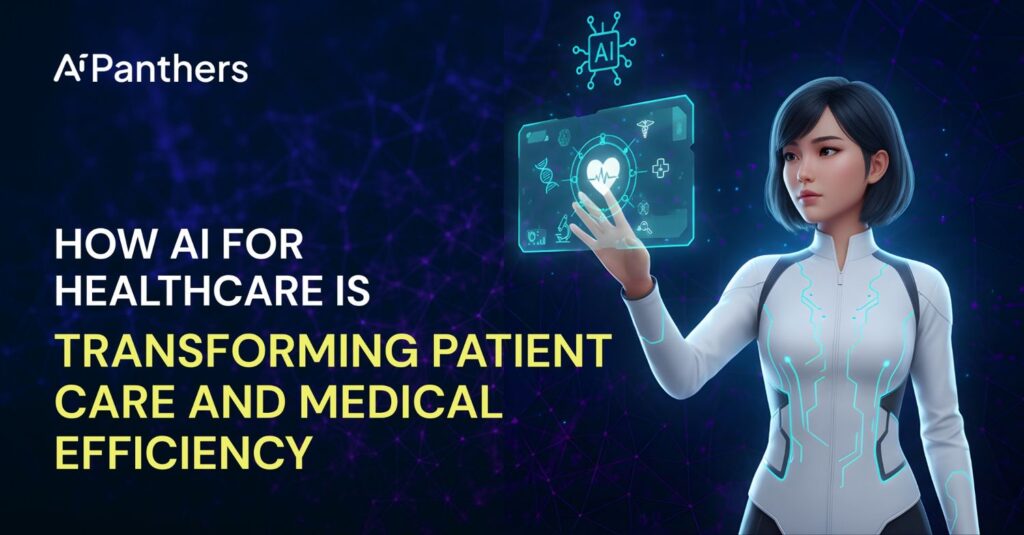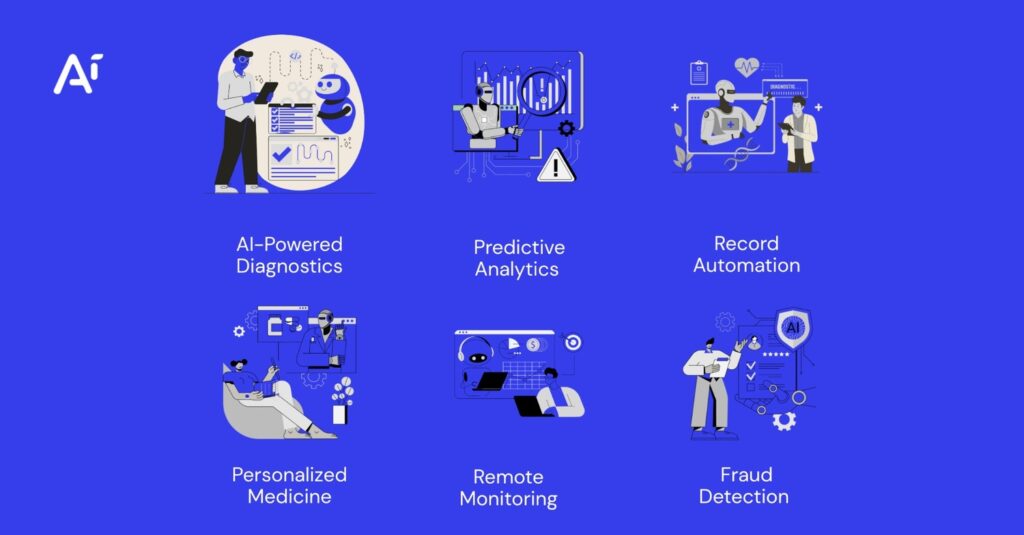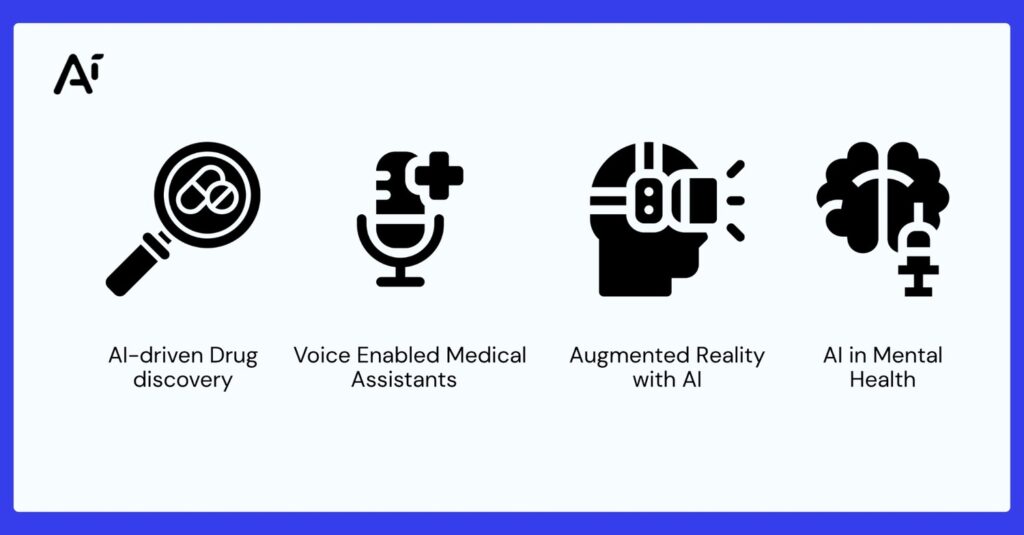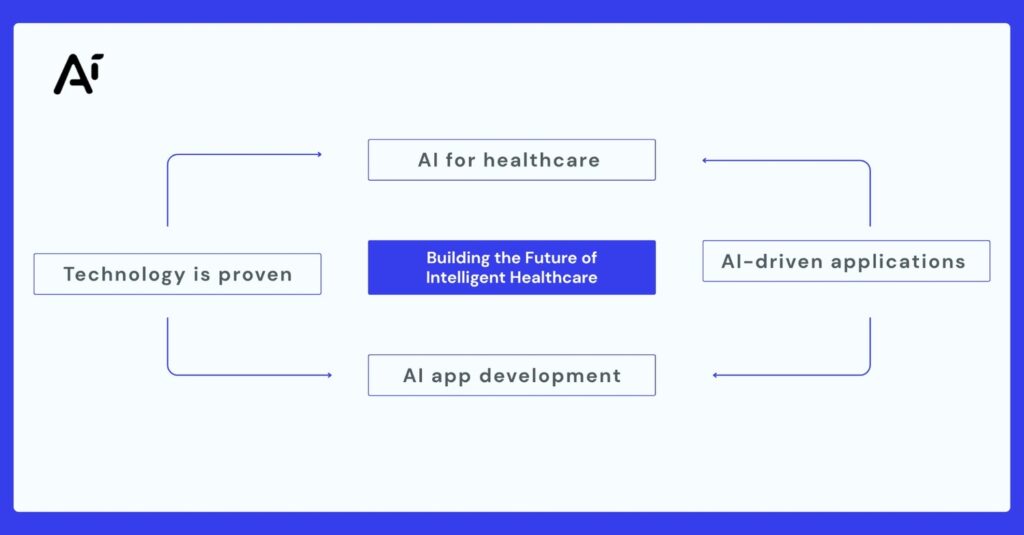
Healthcare today stands at the edge of a remarkable digital revolution. Among all the innovations shaping the medical field, artificial intelligence (AI) is leading the charge. From precise diagnostics to predictive analytics, AI for healthcare is driving accuracy, efficiency, and life-saving outcomes like never before.
For healthcare providers, AI is no longer a futuristic idea; it’s a practical tool improving operations, decision-making, and patient care every day. The result? Shorter diagnosis times, reduced errors, better patient engagement, and improved clinical outcomes.

Over the past few years, the global adoption of AI in healthcare has skyrocketed. Hospitals, diagnostic centers, and research organizations are leveraging machine learning, computer vision, and natural language processing to manage complex data and enhance care delivery.
According to industry reports, healthcare is now one of the top sectors investing in AI app development. The demand stems from the need for accuracy, cost reduction, and better patient outcomes — all core benefits of integrating AI technology into medical systems.
At AI Panthers, we recognize this transformation. As an AI-first healthcare app development company, we focus on designing intelligent applications that bring automation, accuracy, and insight to every layer of healthcare delivery.
Diagnostic accuracy is the foundation of effective treatment. However, human interpretation can sometimes lead to delays or misdiagnosis. That’s where AI-powered diagnostic tools are proving game-changing.
By using advanced image recognition models, AI systems can detect abnormalities in X-rays, MRIs, and CT scans faster and often with greater accuracy than the human eye. For instance, solutions like Google DeepMind and Zebra Medical Vision analyze thousands of medical images to detect early signs of diseases such as cancer, heart conditions, and neurological disorders.
The benefits of AI in hospitals extend beyond speed. These systems continuously learn and improve, enhancing diagnostic precision over time. This directly reduces the margin of human error — ensuring that patients receive accurate diagnoses and timely treatments.
Predictive analytics is another area where AI for healthcare is setting new standards. By processing large volumes of patient data, AI models can identify trends and forecast potential health risks.
For example, AI algorithms can predict patient readmission probabilities, identify those at high risk for chronic conditions, or even forecast outbreaks of infectious diseases. Hospitals like the Cleveland Clinic use predictive analytics to monitor ICU patients and detect early warning signs before critical deterioration occurs.
This proactive approach enhances both efficiency and patient safety. It allows doctors to intervene early, improving outcomes and reducing hospitalization costs.
Managing patient records is a time-consuming task that often diverts medical professionals from direct care. AI-based automation tools are now helping healthcare organizations process and analyze massive data sets from Electronic Health Records (EHRs) using natural language processing (NLP).
Platforms like Nuance’s Dragon Medical One convert voice or text data into structured records, making documentation faster and more accurate. This not only minimizes administrative workload but also ensures that critical patient information remains consistent and up to date.
Such AI-driven automation empowers doctors to focus on what truly matters — patient care — while maintaining accuracy in documentation and compliance.
No two patients are alike, and AI recognizes that. The future of healthcare AI is centered around personalization — using algorithms to design treatments customized to each patient’s genetic profile, medical history, and lifestyle.
Companies like Tempus are leading the way in AI-driven precision medicine, helping doctors choose therapies that are most likely to succeed based on patient-specific data.
For healthcare providers, this means fewer trial-and-error treatments, faster recovery rates, and improved patient satisfaction. Personalized AI solutions also reduce unnecessary medical costs by focusing resources where they are most effective.
Post-pandemic healthcare has seen an explosion in telemedicine adoption. AI is taking this trend to the next level by powering intelligent telemedicine platforms and remote monitoring systems.
Smart wearable devices now track vital signs like heart rate, oxygen levels, and sleep patterns. When combined with AI analytics, these tools can detect irregularities and send instant alerts to healthcare providers.
For example, platforms such as Teladoc and HealthTap integrate AI symptom checkers, helping patients receive guidance and care recommendations without stepping into a clinic.
This shift not only boosts accessibility but also ensures continuity of care for patients in remote locations or those managing chronic conditions.
Beyond patient care, AI is transforming the financial and operational sides of healthcare. Hospitals and insurance companies are using AI models to detect fraudulent claims and automate approval processes.
By analyzing historical data and identifying anomalies, AI can quickly flag suspicious activity, improving compliance and reducing financial losses. This automation streamlines workflows, allowing organizations to allocate resources more efficiently.

The AI healthcare trends shaping the next decade will revolve around deeper integration, patient-centered systems, and ethical AI governance. Here are a few trends to keep an eye on:
Each of these innovations aligns with the industry’s broader goal: to make healthcare more predictive, personalized, and preventive.
Hospitals adopting AI solutions are already witnessing measurable improvements across various departments.
Key benefits of AI in hospitals include:
By combining AI app development with real-world healthcare challenges, organizations can bridge the gap between medical expertise and technological innovation.
The future of healthcare AI lies in collaboration — between humans and intelligent systems. AI will not replace doctors; it will augment their abilities, providing them with data-backed insights and more time to focus on patients.
As AI continues to mature, we’ll see a more seamless integration of data, devices, and diagnostics. Healthcare applications will evolve into full-scale ecosystems capable of managing end-to-end patient care with precision and empathy.

AI is redefining what accuracy, speed, and compassion mean in medicine. From early diagnosis to patient engagement, AI for healthcare ensures every step in the medical journey is more innovative and more efficient.
At AI Panthers, we help healthcare organizations build AI-driven applications that enhance performance, ensure precision, and transform patient outcomes. Our expertise in AI app development allows hospitals and enterprises to integrate intelligent systems that make healthcare more connected, efficient, and human-centered.
The healthcare industry is ready. The technology is proven. The question now is — are you prepared to lead the future of healthcare innovation with AI?